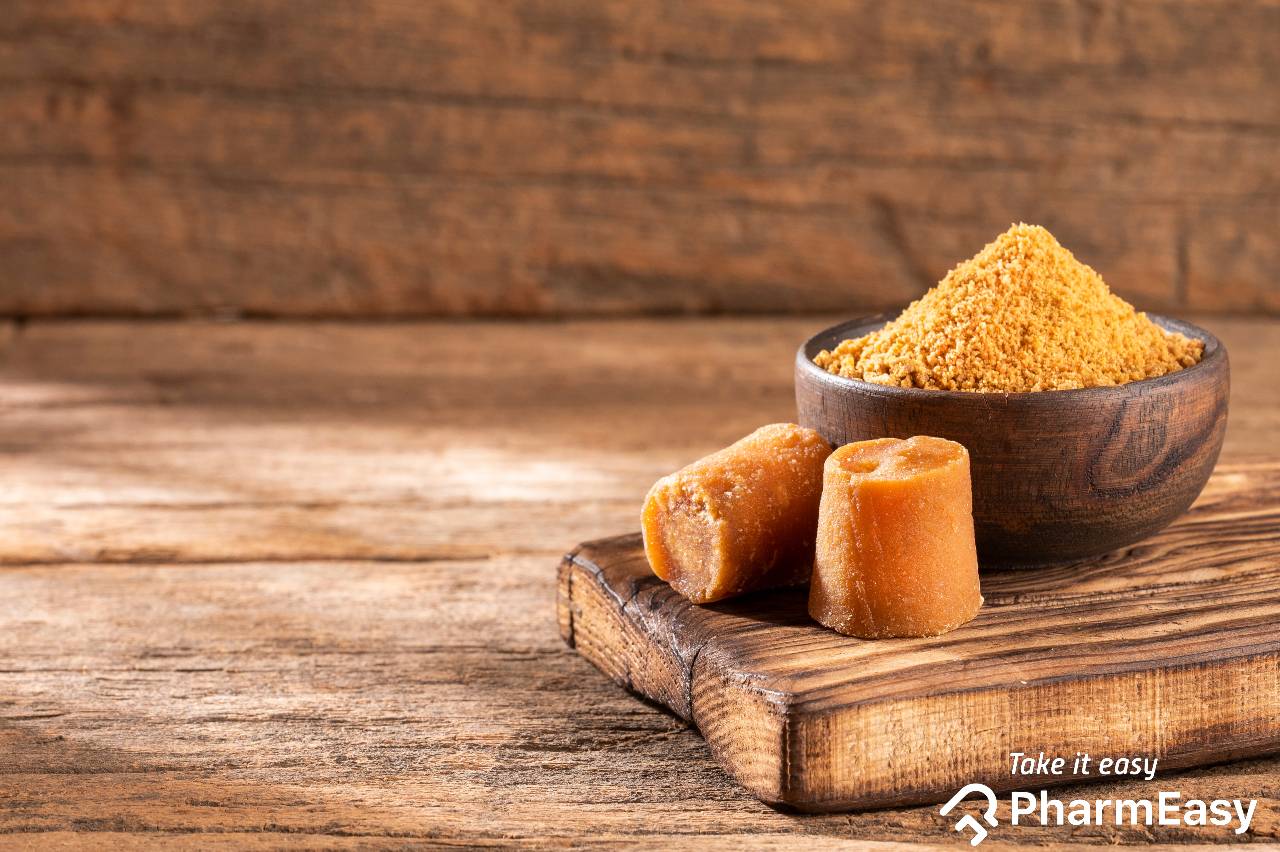
Introduction
Jaggery also known as “Gur or “Gud”, has been used extensively over the years for its many benefits. Due to the wide use of jaggery in Ayurveda, it is also called “medicinal sugar”. It is prepared by processing or boiling sugarcane juice, obtained from the sugarcane plant “Saccharum officinarum”. Jaggery is also known as gud, vellam, Bella or bellam. In an Indian diet, it is consumed either directly or used to prepare several sweet-based foods. Jaggery is used to prepare several traditional sweet dishes like karadantu, godhi huggi, chikki, gazak, and payasam1. This nutritious, unrefined sugar offers several benefits. Daily consumption of jaggery may help with asthma, cold, cough, and anaemia and may act as a natural cleansing agent.
Nutritional Value of Jaggery
Jaggery contains various nutritional components that are given in the table below. They are rich in a variety of compounds including vitamins, minerals, proteins, and antioxidants like selenium, Vitamin A, Vitamin C, and Vitamin E.
The solid jaggery nutritional value per 100g is as follows:2:
- Energy: 383 Kcal
- Sucrose: 65-85 g
- Protein: 0.4 g
- Fats: 0.1 g
- Vitamin C: 7.0 mg
- Vitamin E: 111.3 mg
- Vitamin A: 3.8 mg
- Vitamin B5: 0.01 mg
- Vitamin B6: 0.01 mg
- Vitamin B2: 0.06 mg
- Vitamin B1: 0.01 mg
- Potassium: 10-56 mg
- Phosphorus: 20-90 mg
- Calcium: 40-100 mg
- Magnesium: 70-90 mg
- Sodium: 19-30 mg
- Copper: 0.1-0.9 mg
- Iron: 10-13 mg
- Zinc: 0.2-0.4 mg
Properties of Jaggery
Scientific literature has found jaggery to show numerous properties as those mentioned below:
- It may act as an anti-toxic agent.
- It might have anti-neoplastic properties.
- It may have antioxidant properties.
- It may have a decongestant effect3.
Potential Uses of Jaggery for Overall Health
Some of the potential benefits of jaggery are described as follows:
1. Potential Uses of Jaggery for Hepatorenal Injury
- Jaggery benefits may help hepatorenal injury (commonly called Hepatorenal Syndrome or HRS) as it has detoxification properties and its consumption may help remove toxins from the body and contribute to liver health.
- A study4 assessed the effect of jaggery on hepatorenal injury caused by carbon tetrachloride. The intervention was carried out in rats, which received an aqueous extract of jaggery at a dose of 250, 500, and 750mg/kg body weight.
- Observations under the microscope showed a degree of tissue recovery in treated groups. This indicates that jaggery may help reduce hepatic and renal damage. However, this study was conducted on animals, and more human studies are needed to support these claims.
2. Potential Uses of Jaggery for Asthma and Allergies
- Asthma is characterised by the narrowing and inflammation of the airways, making breathing difficult.
- Jaggery is a rich source of iron, which may help support healthy haemoglobin levels. Haemoglobin plays a key role in transporting oxygen throughout the body, and maintaining adequate levels may support general respiratory function5.
- Some traditional practices suggest that jaggery may be useful in supporting respiratory health. It also contains trace elements such as selenium, which are believed to assist in neutralising certain external substances in the body3,6. However, more studies are needed to confirm these claims in humans.
3. Potential Uses of Jaggery in Smoke-Induced Lung Lesions
- Exposure to dust, smoke, or industrial pollutants may lead to irritation or scarring of lung tissue over time. Traditional practices have sometimes associated jaggery with respiratory comfort, particularly in environments with air pollutants.
- One experimental study examined the effect of jaggery on dust-exposed rats, where the animals received 0.5 grams of jaggery daily for 90 days. The study observed a potential preventive effect on smoke-induced lung changes and suggested that jaggery might assist in the clearance of inhaled particles from lung tissue.
- This study showed the preventive action of jaggery on smoke-induced lung lesions and may indicate that jaggery can help in managing smoke-induced lung lesions6. However, human studies are required to ascertain these claims.
4. Potential Uses of Jaggery for Anaemia
- Anaemia often caused by iron deficiency, is characterised by a reduction of haemoglobin in the blood. Jaggery is a good source of iron and may help iron intake. It is also believed to have pitta-balancing properties in Ayurvedic practice5.
- However research is limited and individuals with anaemia or related concerns, are advised to seek guidance from a qualified healthcare professional.
5. Potential Uses of Jaggery for the Heart
- Jaggery benefits the heart as it is a good source of potassium, which may help regulate heart function and blood pressure. Additionally, the potassium content in jaggery may help reduce the risk of cardiac diseases.
- The presence of magnesium in jaggery may help in protecting the blood vessels. Therefore, there is a possibility that the consumption of jaggery may positively impact the heart, but we need more human studies to support these claims5.
6. Other Potential Uses of Jaggery
- The presence of magnesium in jaggery may help reduce stress and relax muscles.
- The presence of calcium in jaggery may help in improving bone health.
- It may purify blood and help in managing diseases like jaundice.
- The presence of zinc and other minerals in jaggery may help in boosting immunity.
- When consumed in moderate amounts, jaggery may help manage constipation, and stomach pain and improve digestion.
- It may help in regulating the menstrual cycle due to the release of endorphins5.
Though there are studies that show the benefits of jaggery in various conditions, these are insufficient and there is a need for further studies to establish the true extent of the benefits of jaggery on human health.
How to Use Jaggery?
Jaggery can be used in the following ways:
- It can enhance the flavour of savoury dishes, such as sambhar and Gujarati curries, by adding a mild sweetness.
- Jaggery is widely used in the preparation of several traditional sweet dishes like chikkis (nut brittle) and laddus, making it a common alternative to refined sugar in the food industry. It is an essential ingredient in Puranpoli, a well-known Maharashtrian dish, where its rich sweetness complements the spiced lentil filling.
You must consult a qualified doctor before taking any herbal supplements. Do not discontinue or replace an ongoing treatment of modern medicine with an ayurvedic/herbal preparation without consulting a qualified doctor.
Jaggery is a traditional sweetener that is often included in meals for both its flavour and cultural significance. It is traditionally believed to help support digestion and may contribute to maintaining body warmth or promoting comfort after meals. In some practices, jaggery is also used to help with digestion. Preliminary studies have explored its potential roles in liver function and in supporting general well-being. Some individuals also use jaggery during certain times of the menstrual cycle9.
Dr. Rajeev Singh, BAMS
Side Effects of Jaggery
While jaggery is a popular traditional sweetener, it should be consumed in moderation. A few considerations include7:
- The sugar content of jaggery is equal to that of white sugar. Thus, excessive consumption should be avoided in diabetic patients.
- The consumption of jaggery may cause allergies. In individuals who are sensitive to sugars.
- Excessive jaggery consumption can contribute to an increase in body weight.
- Overconsumption of jaggery can cause difficulty in bowel movements. Additionally, freshly prepared jaggery may be harder to digest for some people.
However, if you experience any adverse reactions to jaggery, immediately contact a doctor or your Ayurvedic physician who has prescribed it to you. They will be able to guide you appropriately for your symptoms.
Also Read: Bael (Aegle Marmelos): Uses, Benefits, Nutritional Value & Side Effects
Precautions to Take with Jaggery
Eating jaggery is right if it is taken in moderate amounts. However, general precautions must be followed while consuming jaggery.
- Consuming moderate quantities of jaggery for diabetes is okay, but diabetics should avoid overeating jaggery as its sugar content is comparable to white sugar.
- It is advised to avoid jaggery consumption if you are intolerant to sugar, because this may trigger an allergic reaction.
- Eating jaggery in excess can cause stomach pain and indigestion4.
Consider replacing refined white sugar with jaggery, a traditional, less processed sweetener. When combined with natural spices like ginger, turmeric, cardamom, or black pepper, jaggery offers a flavourful alternative that many find appealing8.
Dr. Siddharth Gupta, B.A.M.S, M.D (Ayu)
Interactions with Other Drugs
There is limited data regarding the interaction of jaggery with drugs. However, you must always seek the advice of your Ayurvedic physician about the possible interaction of jaggery with other drugs, and follow the prescription thoroughly, as they will know your health condition and other medications you are taking.
Also Read: Psyllium Husk (Isabgol): Uses, Benefits & Side Effects
Conclusion
Jaggery, often called “medicinal sugar,” is a traditional and nutritious sweetener valued for its potential health benefits, including support for digestion, respiratory health, and anaemia. While it may complement a healthy lifestyle, jaggery should be consumed in moderation, especially by those with sugar sensitivities or diabetes, and should never replace professional medical advice or treatment.
Also Read: Pudina (Mint): Uses, Benefits, Side Effects & More!
Frequently Asked Questions (FAQs)
What are the side effects of jaggery?Excessive consumption of jaggery can result in stomach pain. Freshly made jaggery can result in indigestion and allergy in individuals who are intolerant to sugar.
Does regular consumption of jaggery help regulate the menstrual cycle?Yes, the consumption of jaggery may help regulate the menstrual cycle, but there are not many studies to support this claim. Consult your doctor for appropriate guidance and treatment.
Can the consumption of jaggery help in managing iron-deficiency anaemia?Yes, consumption of jaggery may help improve iron-deficiency anaemia due to its high iron content and pitta-balancing properties. However, not enough studies have been conducted to support these claims. So, it is advised to consult a doctor for proper treatment.
Is it safe to consume jaggery in diabetes?The sugar content in jaggery is equal to white sugar. Although, consumption in moderate quantities is safe, you must consult your doctor for appropriate advice.
Is it safe to consume jaggery when taking medicines?Although, no significant interactions are reported with the consumption of jaggery with medicines, it is recommended to consult a doctor to assess possible drug interactions.
Is jaggery better than sugar?
Jaggery is often considered healthier than refined sugar because it is less processed and retains some natural nutrients. Unlike white sugar, which mainly provides empty calories, jaggery contains small amounts of minerals such as iron, potassium, calcium, and magnesium. It also has trace antioxidants that may support digestion and help cleanse the body.
Can I eat jaggery every day?
Jaggery can be eaten daily in small amounts as it provides natural energy and some essential minerals. However, it is high in sugar and excess intake may raise blood glucose levels. People with diabetes, obesity, or metabolic disorders should consult a doctor or dietitian before consuming jaggery regularly.
References
- Lamdande AG, Khabeer ST, Kulathooran R, Dasappa I. Effect of replacement of sugar with jaggery on pasting properties of wheat flour, physico-sensory and storage characteristics of muffins. J Food Sci Technol. 2018 Aug;55(8):3144-3153. doi: 10.1007/s13197-018-3242-7. Epub 2018 Jun 1. PMID: 30065425; PMCID: PMC6046027. Available at: https://www.ncbi.nlm.nih.gov/pmc/articles/PMC6046027/
- Parth Hirpara et al. Jaggery: A natural sweetener. Journal of Pharmacognosy and Phytochemistry 2020; 9(5): 3145-3148. Available at: https://www.phytojournal.com/archives/2020/vol9issue5/PartAR/9-5-516-642.pdf
- Jahan, Afifa. (2019). Jaggery: A traditional, Nutritional and medicinal sweetner. 32. 20. Available at: https://www.researchgate.net/publication/342465207_Jaggery_A_traditional_Nutritional_and_medicinal_sweetner
- Sharma CK, Saxena M, Sharma V. Jaggery protects hepatorenal injury induced by acute exposure to carbon tetrachloride in Wistar rats. J Environ Pathol Toxicol Oncol. 2013.doi: 10.1615/jenvironpatholtoxicoloncol.2013006793. PMID: 23758147. Available at: https://pubmed.ncbi.nlm.nih.gov/23758147/
- Rao GP, Singh P. Value Addition and Fortification in Non-Centrifugal Sugar (Jaggery): A Potential Source of Functional and Nutraceutical Foods. Sugar Tech. 2022;24(2):387-396. doi: 10.1007/s12355-021-01020-3. Epub 2021 Jul 27. PMID: 34334974; PMCID: PMC8314846. Available at: https://www.ncbi.nlm.nih.gov/pmc/articles/PMC8314846/
- Sahu AP, Saxena AK. Enhanced translocation of particles from lungs by jaggery. Environ Health Perspect. 1994 Oct;102 Suppl 5(Suppl 5):211-4. doi: 10.1289/ehp.94102s5211. PMID: 7882934; PMCID: PMC1567304. Available at: https://www.ncbi.nlm.nih.gov/pmc/articles/PMC1567304/
- Parth Hirpara, Nitin Thakare, Vijay Kele, Patel D. Jaggery: A natural sweetener. Journal of Pharmacognosy and Phytochemistry [Internet]. 2020 Sep [cited 2025 May 30];9(5):3145–8. Available from: https://www.researchgate.net/publication/344921769_Jaggery_A_natural_sweeten
- Rao GP, Singh P. Value addition and fortification in non-centrifugal sugar (jaggery): a potential source of functional and nutraceutical foods. Sugar Tech. 2021 Jul;24(1):??–??. doi:10.1007/s12355-021-01020-3. Available from: https://link.springer.com/article/10.1007/s12355-021-01020-3
- Shitole VM, Chavan N, Duggal M. Consumers preference towards organic food products: a study in Pune city with reference to jaggery. TOJDEL (Res J Pharmacol Pharmacodynamics). 2022 Jan;11(1):33–40. Available from: https://tojdel.net/journals/tojdel/articles/v11i01c02/v11i01-33.pdf
Disclaimer: The information provided here is for educational/awareness purposes only and is not intended to be a substitute for medical treatment by a healthcare professional and should not be relied upon to diagnose or treat any medical condition. The reader should consult a registered medical practitioner to determine the appropriateness of the information and before consuming any medication. PharmEasy does not provide any guarantee or warranty (express or implied) regarding the accuracy, adequacy, completeness, legality, reliability or usefulness of the information; and disclaims any liability arising thereof.
 14
14
 1
1 






























Comments